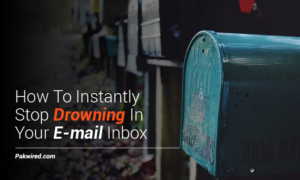Every single one of us receives e-mails. Some of us receive a handful, others hundreds (or millions, if you were Bill Gates in 2004). No matter how many you get, however – and irrelevant of how important e-mail is to your day – it can always be seen as something you’re battling against; something that’s distracting you from actual ‘work’.
A quick search in Google and you’ll find a whole variety of different ways to manage your e-mail inbox. Often including the use of automation tools or pieces of software, I have a three-step tip that doesn’t use any such products, but has meant I’m never battling against my inbox and always feel in control – and it’s called Reply, Delegate or Schedule.
More of a mental attitude / approach to your e-mail inbox than anything else, it’s simply a case of understanding there are three types of e-mail you will only ever receive, then knowing how to action each of them so they aren’t, for example, sitting around in your inbox for days on end:
1. If an e-mail comes in that can be replied to quickly straight away, do so
A good percentage of the e-mails we receive only require a short response. In fact, they would be better sent as an instant message on something such as Google Hangouts or Skype. If this was the case, we’d respond to them instantly – so why don’t we do the same when they come in via e-mail?
Instead, we’ll read it and then often leave it until later in the day. But why? It only takes seconds to respond and can then be cleared from our inbox.
As such, as soon as an e-mail comes in that can be replied to immediately and it won’t take long – let’s say 30 to 60 seconds – do so. Write the reply and then file away that e-mail.
Quick, simple and likely to reduce a good amount of your daily e-mail stress instantly.
2. If an e-mail needs a longer response, but you don’t have to do it, delegate
One group e-mail tactic you’ll often seen employed in corporations is the recipients playing ‘chicken’ with one another – no one will reply to a request at first, betting on the fact someone else will. And invariably they do.
The problem with this is that e-mail is always on your mind. You know it needs an in-depth response and you know you could give it, but you also know other people can, yet you’re hoping they will, rather than knowing they will.
The solution? Just ask someone else.
Don’t wait and hope. Ask someone to respond. It’ll immediately remove that e-mail from your inbox and your mind.
And this approach isn’t just restricted to corporates or group e-mails. Delegating work is fantastic, as it frees you up to focus on other areas of your day and as such, if you receive e-mails you know a colleague or subordinate can respond to effectively, ask them to do so.
By doing this, the reality is the majority of those asked will be able to confidently respond, freeing up your time from what could have been a lengthy e-mail response.
3. If an e-mail needs a longer response and you have to do it, schedule
Now as fantastic as it would be to delegate all of your e-mails that require a lengthy response, we all know that’s simply not a possibility. There are always going to be e-mails that you personally have to respond to in an in-depth way.
They key to these, however, is to schedule them into your working day.
When such an e-mail comes in, don’t let it distract you from what you’re doing. Read it, determine its importance in terms of a response and then schedule a suitable and appropriate amount of time into your diary to reply.
Setting aside time for e-mails may sound slightly unusual, as it’s supposed to be an instant method of communication, right? Well, yes – to a certain extent.
We’ve become so reliant on e-mail, and integrated it so much within our lives, that that requirement for an instant response is no longer constantly apparent. People are happy to wait – they would rather receive the right response in several hours or days, rather than a rushed one immediately.
What’s more, scheduling time in for e-mailing isn’t unheard of in any way, shape or form – there are plenty of people who only e-mail at certain points of the day. Tim Ferriss, author of “The 4-Hour Work Week” stated back in 2008 that one of his reasons for success was only checking e-mail twice a day. For the times outside of those periods, if you need an answer to something, you have to call or meet face-to-face.
E-mails are a necessary part of our everyday lives, but they can so quickly take over them. Don’t let this happen. Don’t drown in your e-mail inbox – and with a little self-management, you really don’t ever have to.


